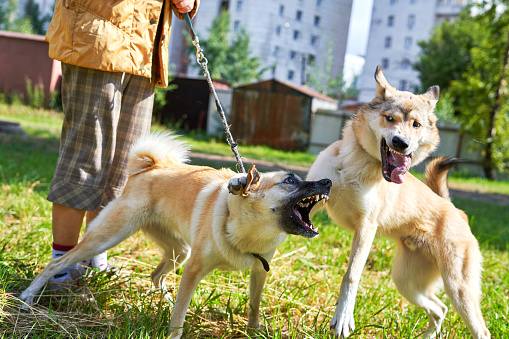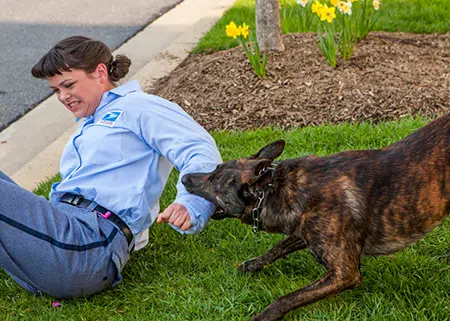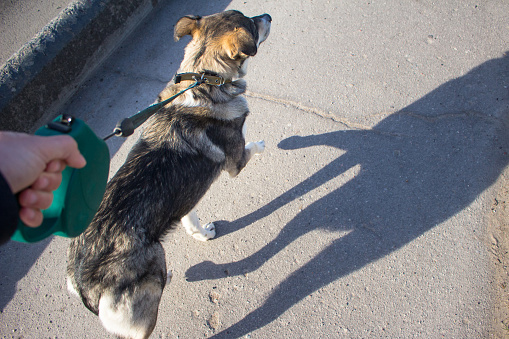After a dog bite, the immediate rush of emotions can be overwhelming. You’re bleeding, in pain, and rattled. It’s a lot to process at the moment. While getting medical attention is an obvious priority, you might also wonder: Should I report the dog bite to the police? What happens after a dog bite is reported?
At Slater & Zurz, we understand your emotional rollercoaster after a dog bite. We’ve seen firsthand in thousands of cases how emotionally traumatizing dog bites can be, especially if you’re a dog lover yourself. It’s natural to feel conflicted about escalating the situation, especially when the dog owner is cooperative and remorseful.
However, the decision to call the police is not just about your visible injuries—it’s about safeguarding your both your physical well-being and legal rights. That’s why we don’t just handle the legal side of things; we also ensure you have the comprehensive support you need during this difficult time.
Why You Should Contact the Police After A Dog Bite
In the scary aftermath of a dog bite, the first priority is always your safety. If the injuries are serious or the dog is still acting aggressively, calling 911 is essential.
But what if the injuries appear minor? Let’s talk about what to consider in deciding whether you should report a dog bite to police.
A police report documents the incident
As a personal injury lawyer, I cannot stress enough the importance of documentation. Beyond obtaining medical records and taking photos of your injuries, securing a police report is a must. It solidifies your account of the event and serves as legal documentation, which is invaluable if you decide to seek compensation later on.
Pro tip: You don’t typically need to sue to recover medical costs after a dog bite. A dog bite lawyer can help you file a claim directly with the owner’s insurance.
A police report protects others from future harm
Reporting a dog bite to the police isn’t just about protecting yourself; it can also help keep others safe. If the dog has a history of aggression, or if the incident shows the owner wasn’t taking proper precautions, the authorities can take steps to ensure the community’s safety.
This might involve requiring the owner to use stricter control measures, like a muzzle or leash, when walking the dog. The dog may also have to undergo behavioral training. In some cases, the owner could be fined as well.
Ultimately, filing a police report helps prevent future attacks and keeps everyone safe in their own neighborhood.
A police report ensures legal compliance and support
When you report a dog bite to police, you’re not just documenting an incident—you’re activating a community safety mechanism. Local authorities, equipped with the right tools and knowledge, step in to assess not just the immediate danger but also the broader circumstances that led to the bite.
Your local dog warden and animal control team don’t just enforce the laws, they work to maintain the delicate balance between animal behavior management and public safety.
How to Report A Dog Attack to Police
We know that contacting the police can be a scary and stressful experience—call our dog bite team at 330-762-0700 to see how we can help.
Online reporting
Many police departments now offer online reporting systems for non-emergency incidents, including minor dog bites. This method is convenient and allows you to provide details without waiting for an officer to respond in person.
In-person reporting
For more severe cases, consider visiting your local police station to file a report. This approach ensures you can communicate all details directly to an officer and ask any questions you might have about the process.
Over the phone
If you’re unable to report the incident online or in person, you can also call the non-emergency hotline of your local police department.
How Long Do You Have to Report A Dog Bite?
Immediately after a dog bite, you might be feeling overwhelmed about the road to recovery and what steps to take. Naturally, one thing we hear a lot is, “How long do I have to report a dog bite to police?”
Generally, the earlier you can file a police report, the better. It helps with:
- Getting the care you need. A police report creates an official record of the incident. This can help ensure you get the medical attention you need while properly documenting any tests necessary to check for diseases like rabies. The last thing you want to deal with after a dog bite is confusion about what follow-up care is needed.
- Protecting your rights. A quick report establishes a clear record of what happened. This is crucial if you ever need to seek compensation for your injuries or if there are any disagreements about how the bite happened.
That said, if the dog bite happened a few weeks or months ago, it’s not too late to take action. Ohio’s statute of limitations for dog bite incidents is two years, meaning you have up to two years from the date of the bite to file a claim.
We understand this is a stressful time, and navigating legalities can feel daunting. That’s why talking to a personal injury lawyer who specializes in dog bites is so important—we can provide clear legal advice, handle the paperwork, and fight for the justice you deserve.
For a free consultation on your situation, call us at 330-762-0700.
What Happens After A Bite is Reported in Ohio?
It’s natural to worry about what will happen to the dog, especially if it’s a beloved pet of someone you know. Here’s what will typically unfold after you report a dog bite to police in Ohio:
- Quarantine. To ensure the dog is healthy and not a rabies risk, it may need to be quarantined. This doesn’t mean the dog is in trouble; it’s a standard precaution that can happen at an animal shelter or at the owner’s home under careful supervision.
- Investigation. Local authorities, like animal control or the health department, will conduct a thorough investigation. They’ll speak with the dog’s owner, look into any previous incidents, and gather all the details about the bite.
- Dog evaluation. In some cases, a professional might evaluate the dog’s behavior. This assessment is aimed at understanding the dog’s temperament and determining its likelihood of biting again.
- Corrective measures. This might include specialized training to address behavioral issues or safety precautions like using a muzzle in public spaces. The decision to consider euthanasia is taken very seriously and is only considered in extreme cases.
Remember: The goal here is to keep everyone safe while treating the dog as humanely as possible. Reporting a dog bite to police doesn’t mean you want the worst for the dog; it means you’re taking a responsible step toward preventing future incidents.
Get The Legal Support You Need
If you’re ever in doubt about what to do after a dog bite, remember that taking action by contacting the police can protect others from future harm. It’s not about overreacting; it’s about being proactive in a situation where, unfortunately, the stakes can quickly escalate.
For more personalized advice or to discuss the specific details of your dog bite, don’t hesitate to contact us at 330-762-0700 for a free consultation. Our team of dog bite lawyers is here to protect your rights and ensure you receive the support and guidance you need during these stressful times.
Frequently Asked Questions
- When should I call the police after a dog bite?
- As soon as possible, especially if the bite has broken the skin or if you feel threatened by the dog or the situation. However, it’s worth filing a report to officially document the incident even after you’ve healed.
- What happens after you file a police report about a dog bite?
- Once a report is filed, the police will typically investigate the circumstances surrounding the incident. This may involve interviewing witnesses, collecting medical records of the injury, and assessing the dog’s behavior and environment. Local animal control may also evaluate the dog for public safety and determine if further actions, such as quarantine, are necessary.
- Is a police report required for seeking dog bite compensation?
- While a police report is not strictly required for seeking compensation after a dog bite, it significantly strengthens your legal case, especially if the dog owner disputes the circumstances or the severity of the injury.
- Do hospitals report dog bites to police?
- It depends. They might notify police, animal control, or public health departments depending on local laws and the severity of the bite.
- Can you file a police report for a dog attack?
- Absolutely! You can (and should) file a police report after a dog attack. This helps document the incident and is essential for legal compensation or animal control involvement.





